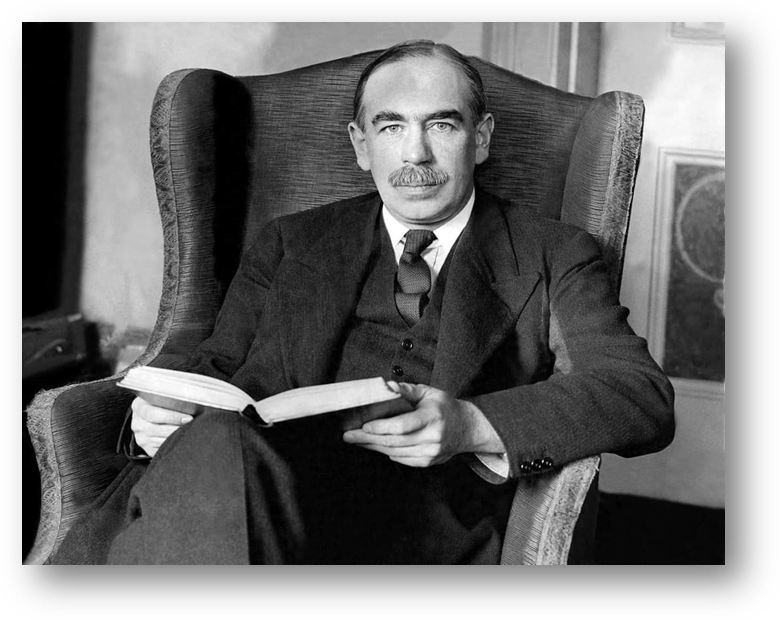Politicon.co
The Concept of John Maynard Keynes: Survival of Modern Capitalism
The British economist John Maynard Keynes (1886-1946) is the greatest man who changed the modern macroeconomic world. The economic and political form of modern capitalism was evolved by the Keynesian conception.
Born on June 5, 1886, in Cambridge, England, as the son of an economist, Keynes devoted his entire life to theoretical and practical economic science. He also became important figure in global political-economical system.
Opposing the traditional neoclassical economic model, Keynes put forward economic criticism during the turbulent times of the world.
For understanding of the importance of Keynes, we should first observe the global political situation. Political and ideological fronts were also formed in the deep turbulent economic and political course of the vortex of World War II in the 20th century. The expanding marxist-communistic movements from the late 19th century created both a threat to capitalism and to its regulatory function. Along with social democrats, communists, and various forms of marxist currents, in addition more dangerous extreme national socialist, racist-fascist systems were also formed.
Furthermore, political and economic power, material-ideological standards, the general surviving of capitalism was rotating in turmoil. The scientific and reformist changes had already been inevitable. These conditions were the main factor that shaped Keynes conception. In particular, economic crises have always caused to wars and the evolution of civilization history illustrates that it will be occurred ever.
The general theory of Keynes comprises the macro-micro economic structure, covering everything from the regulatory role of the state to fiscal and monetary policy, from unemployment to supply-demand concepts.
In this paper, I will present Keynesian economic concepts as systematized as possible:
1. One of Keynes's main economic proposals was to abandon gold in the global exchange process. Keynes argued that an unnecessary suspension of payments could damage the city's future reputation. Despite this, the rejection of gold would be beneficial for a structure with a single capitalist domination, but the future would be intricate.
2. Keynes criticized the economic foundations of the Treaty of Versailles after World War I. He did not consider the heavy financial sanctions against Germany to be correct. He declared that the crisis in a dynamic country like Germany would have a negative impact on the world as a whole and the global economic system would suffer. He considered it dangerous to reduce the purchasing power of the Germans.
3. Keynes proposed to devalue the pound sterling to solve the problem of rising unemployment in Great Britain during 1920s. A kind of protectionist attack was to increase exports by lowering the value of money.
4. Keynes considered the fact that the amount of money accumulated and not in circulation in the hands of certain individuals and companies in the state became more than an investment, and saw it as a factor that would lead to crises and increase unemployment.
5. Keynes sharply criticized the British government's austerity measures during the Great Depression. He considered it normal to have certain deficits during an economic downturn. He considered borrowing from the government as a natural way out of a situation that was already on the verge of collapse. He noted the possibility of compensating for job losses.
6. Keynes, in his latest comprehensive book, “The General Theory of Employment, Interest and Money”, specifically opposed the previous economic prism, which predicted that the market would remain naturally balanced without government intervention.
Keynesian theory was ignored for years. It was interesting and at the same time paradoxical that the first to use Keynes's theory in a sense was Hitler's Germany. Global rigid imperialist ambitions and erroneous ideology eventually destroyed Germany.
After the war, Britain and the United States re-discovered Keynes, who seemed to be coming to his smartest senses. In the newly formed world, Keynes was one of the key determinants of the negotiation process of Bretton Woods. The World Bank and the International Monetary Fund were created on the basis of the idea of a single world currency, bank, financial system.
John Maynard Keynes

Before the end of the war, Roosevelt established close ties and meetings with Keynes, who attracted the attention of the United States. Keynes, once neglected by the United Kingdom, was becoming the main scientific and economic basis for the new global economic domination of the United States.
The US economic system continued to operate in the form of Keynesian economics and then evolved Neo-Keynesian economics.
At the end of this article, I would like to explain that Keynes has taken on the role of the main economist who defended a kind of 20th century capitalism. This princip continued in the 21st century. His concept of the role of the state in the economy was not in vain. As Keynes himself emphasized, it will not be possible to save capitalism without state intervention in capitalism!
References:
John Maynard Keynes - The General Theory of Employment, Interest and Money (1936)
Skidelsky, Robert (2003). John Maynard Keynes: 1883–1946: Economist, Philosopher, Statesman
Encyclopedia Britannica - John Maynard Keynes
About the author:
Ramil Hasanov received his BA degree on Political Science at Baku State University. He's obtaining his MBA at Jaen University of Spain.
![]()
- TOPICS :
- Economy
